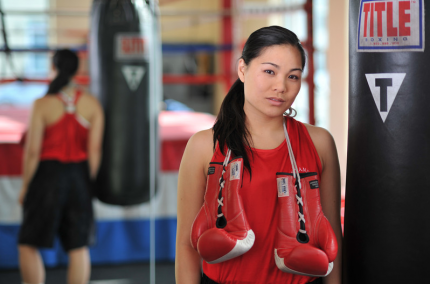Story by Ada Tseng. Photo by Susan Hale Thomas.
Dara Shen is trying to explain what it feels like to get punched in the face. “Have you ever sneezed really hard?” she asks. “That’s what it feels like. I remember the first few times I got hit, my face was sore afterward, but your neck gets used to it. If you’re strong in your neck, you’re not going to be bobbing all over the place, and that’s what causes a knockout: when your chin turns too much in one direction and cuts off the blood to your brain.”
A Taiwanese American boxer who’s hungry for her first U.S. national championship (she already has multiple silvers and bronzes, but her only gold is from when she fought abroad in Taiwan), 27-year-old Shen is no stranger to black eyes. But she’s managed to avoid major injuries thus far, other than a concussion she got when she fought at the Olympic Trials back in 2011.
Despite her (almost) clean slate, Shen concedes that boxing is a dangerous sport and her loved ones have the right to worry when she’s in the ring. It’s no wonder that her parents can’t bear to watch her fight. They’d rather just hear about the results afterward, and they yearn for the day they can throw her a retirement party.
“Being punched in the face is part of the game,” says Shen. “For me, it’s not painful anymore. It’s more of a mental thing: how you deal with it is what makes you who you are as a fighter.”
Born in San Francisco, Shen moved to Utah when she was 11 (raised Mormon, she describes her formative years as being one of the only Asians in a sea of blond hair and blue eyes), before moving to Virginia for high school. Though Shen participated in many sports growing up, it wasn’t until she was a 20-year-old university student at Virginia Tech (going through a bad break-up that left her with much pentup frustration) that she discovered a boxing club at her school.
“I just did it for fun and to get in shape,” remembers Shen, “but I’m very competitive by nature, so once I found out there was a whole world of competition, I fell in love with the sport. I went to my first nationals in 2010.”
[wp_ad_camp_1]
At 5-foot-9-inches and 165 pounds (“My coach calls me ‘Asian Amazon'”), Shen fights in the middleweight division, the highest of three weight classes that were allowed in the first-ever women’s Olympic boxing event held at the London Summer Olympics in 2012. Boxing has long been considered a male-dominated sport – it had been the last-standing all-male sport in the Games for years – and even nowadays, though she competes against other women, Shen does most of her training with her male teammates. (“It’s a treat to get to spar with another girl,” she says.)
All through 2011, Shen competed in numerous qualifying tournaments, fighting to earn a coveted spot at the Olympic Trials, but she kept missing by a hair. The U.S. National Championships qualified the top four; Shen was fifth. The National Golden Gloves took the first-place champion; she came in third. The National PAL qualified the top three; she was four. Once her U.S. opportunities wore thin, she decided to try her luck in Taiwan with her dual citizenship. There, she earned gold at the Taiwan Olympic trials, represented Taiwan in the Women’s World Championships (another qualifier for the Olympics), and there, again, she missed qualifying by one spot.
Eventually, she was able to compete at the U.S. Olympic Trials after there was a last-minute dropout, and she became an alternate for the London Olympics. But looking ahead to the 2016 Games, she wants more. In 2014, she will get another chance to qualify, and her past failures only fire up her passion and hunger to win.
“I lost so much when I first started competing,” Shen remembers. “I lost my first seven fights, so as an amateur boxer, being down 0-7, you have to question, ‘Is this for me?’ But I never saw quitting as an option. This is what I want to do. I’ve seen what my sport has to offer at the most elite level, and I know what it takes to be there.”
While there are numerous respected Asian women boxers abroad, including Ana Julaton of the Philippines and Mary Kom of India, Shen says she has only seen three other Asian American women in her seven years of boxing in the United States – and this includes both athletes and officials.
[wp_ad_camp_2]
“I know when I go to competitions, when people don’t know me, they think, ‘She probably can’t fight. She’s a girl. She’s pretty. She’s Asian. Asians don’t box,'” says Shen. “You get looks from people, and they don’t need to say anything, you already know what they’re thinking. But being Asian in this sport has made me stand out. If you were to go to the tournament and ask for the Asian girl, there’s only one. It’s just me!”
Though she lives for boxing, Shen acknowledges that the sport is struggling, especially with the rise of UFC and mixed martial arts, and despite all the physical risks involved, boxing doesn’t necessarily pay. There are only a couple American women with major sponsorships, and the rest of the fighters have to make a living outside of the sport. Based in Alexandria, Va., Shen herself works a regular 9-to-5 job in project management for construction and real estate development, before heading to the gym each day for
her training workouts.
“It can be depressing if you read into it too much, so I try to do what I can to stay focused on my own goals and not let that part drag me down,” she says. “And that’s what I love so much about boxing – that it teaches you so much about life. If you pay attention to what everyone else is doing, you’re not going to be able to do what you need to do, the best way you can do it. That’s boxing, and that’s life!”
This story was originally published in our Winter 2013-14 issue. Get your copy here.







